Categories
Subjects
Authors
Artists
Venues
Locations
Calendar
Filter
Done
May 2, 2018 – Review
Gallery Weekend Berlin
Filipa Ramos
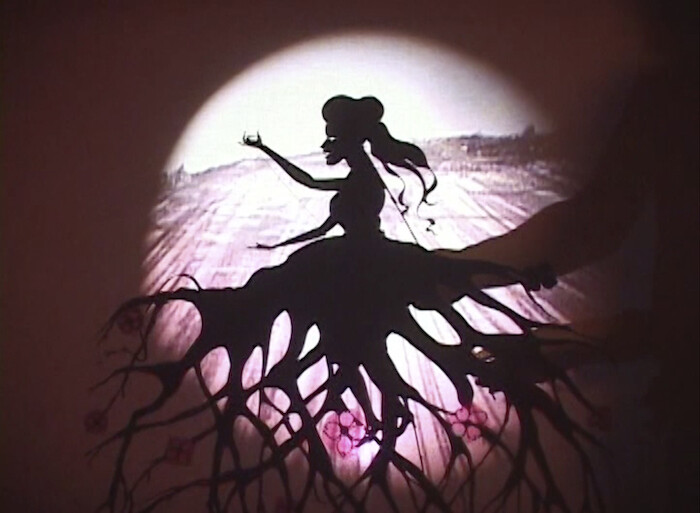
There are occasions in which the multifaceted shape of time becomes obvious. Occasions in which the concentration of similar initiatives, aimed at similar audiences and presenting similar outcomes, attest to the different moments in which organizations, individuals, and their mentalities are situated: how, despite coexisting simultaneously, collective mindsets aren’t contemporary to one another. Aimed at showing trendsetting cultural production and hosted in such a temporally dysfunctional city as Berlin—located in a permanent identity crisis between its haunting past and its daunting ahistorical future—the Gallery Weekend provides a good example of the heterogeneous configuration of this non-time called the present and how art participates in it. The present seems to be constituted by retrospective and anticipatory instances and institutions: individuals, objects, and imaginaries that live in parallel timeframes, either looking back or forward.
Sometimes, these temporal gaps are so large that different centuries span across the more than 50 exhibitions that opened during the Gallery Weekend. While some address the events and concerns that shaped the twentieth century, others look ahead, imagining the future. The moving image-based shows of two North American artists—Kara Walker and Ian Cheng, presented respectively at Sprüth Magers gallery and at the Berlin venue of the Julia Stoschek …
May 2, 2017 – Review
Gallery Weekend Berlin
Sofia Lemos
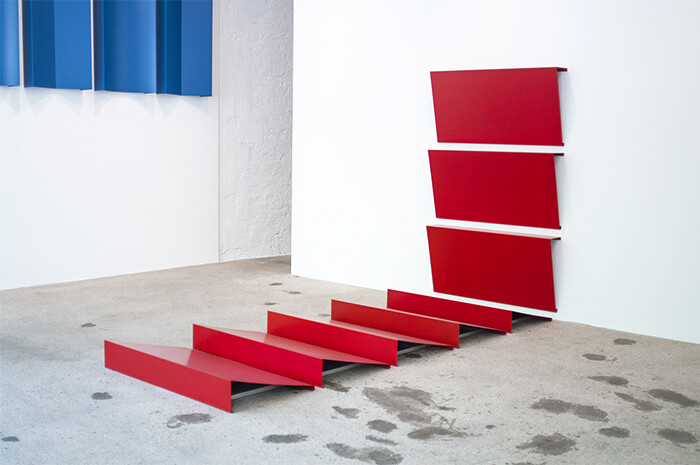
In the wake of the events of May 1968, German Minimalist Charlotte Posenenske wrote in Art International that “it is difficult for me to come to terms with the fact that art can contribute nothing to solving urgent social problems.”,” Art International no. 5 (May 1968), n.p.] Posenenske’s “‘Statement’ [Manifesto],” which initially meant to examine ownership and the reproducibility of her artworks, publicly announced the artist’s dismissal of the art world. Having retrained as a sociologist, Posenenske dedicated herself to working with labor unions and refused to show her work or visit any exhibitions until her death in 1985.
While gallery-goers shuttled through Berlin to the rhythm of scattered attention and market consumption, Posenenske’s show at Mehdi Chouakri set the tone for this year’s edition of Gallery Weekend Berlin. Selected galleries of all scales and scopes made a concerted effort to take up the conflated legacies of modernism, rationalized systems of language, and the critique of whiplash-paced figurations of the modern subject.
Mehdi Chouakri presents a series of abstract sculptures by Posenenske from 1967, as well as a selection of works on paper from the 1950s in their second space, also in Charlottenburg. Displayed in glass vitrines and hanging on the wall, …
May 13, 2016 – Feature
Art Fair Roundup: Berlin, Brussels, Cologne, New York
Stefan Kobel

When Claus Föttinger installed his Bar 60/99-16 (2016) in the booth of Düsseldorf’s Van Horn Gallery at Art Cologne, Rhinelanders did what they are said to do best and partied, using the installation as an actual bar. Yet what might have been expected to be the biggest celebration—the opening of the 50th Art Cologne, the oldest continuously running contemporary art fair—was a rather sober event. Everything was in place: after a long and painful downturn, some important international galleries have returned to the fair since Daniel Hug became director in 2008. Almost all of the predominant German protagonists have become regulars again since the death of Art Forum Berlin in 2010, and collectors from neighboring countries visit the fair, even some Britons and Americans. All this adds to the unrivaled (in Europe) density of private collectors and institutions in the Rhine region. Sales have always been solid—rarely spectacular—at Art Cologne, where the collectors are traditionally educated and savvy but not deep-pocketed.
But for a 50th jubilee one would have expected more. The low-key atmosphere was only partly due the general sentiment of a world in crisis, and there are structural reasons why the fair felt uninspiring. One of its strengths has …
May 2, 2016 – Review
Gallery Weekend Berlin
Karen Archey
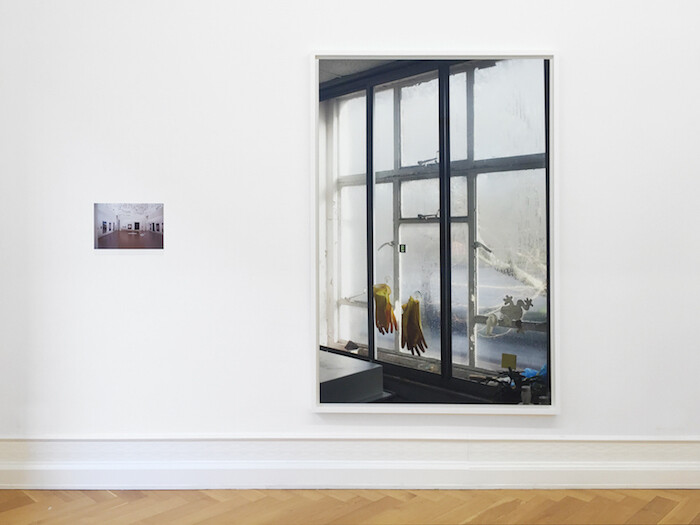
When the 7 percent value-added-tax rate on fine art went up to 19 percent in January 2014, it spelled to many the end of the Berlin art world. Proclamations followed that the market would dry up, and collectors would scatter to more cosmopolitan locales with less pricey export taxes. Without patrons or a steady stream of capital, how could Berlin’s artists thrive? The sheer volume of the jam-packed 2016 edition of Gallery Weekend Berlin suggests that the German capital’s art market is healthy as ever in its upper echelons, especially given the pricey 7,000-7,500 euro gallery participation fee, though younger galleries, perhaps hit hardest by the VAT rate update and who have largely figured these new expenses into the prices of their offerings, have seemingly responded with conservatism.
Two outliers to this trend are Aleksandra Domanović’s “Bull Without Horns” at Tanya Leighton and Alice Channer’s “Early Man” at Konrad Fischer. Domanović’s exhibition fills both of Leighton’s galleries, and includes her now-iconic sculptures featuring the Belgrade hand. Most unique in this exhibition are her new portraits of bulls that have been genetically modified to prevent them from growing horns. The large-scale, documentary-style photographs come off as earnestly tacky in a way that, …
May 4, 2015 – Review
Gallery Weekend Berlin
Kirsty Bell
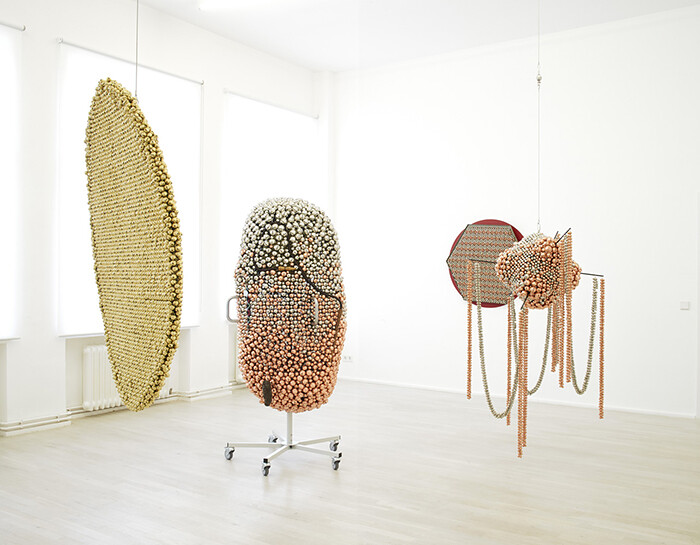
Gallery Weekend arrives just as the first green leaves appear to relieve the city’s relentless gray. This is Berlin at its best: colorful, uncharacteristically cheerful, and ready to welcome the influx of art tourists for its annual weekend of openings and attendant festivities. This year a total of 47 galleries are on the official list, but a host of the additional exhibitions, performances, conferences, and talks, all maddeningly crammed into a three-day period, makes the weekend denser than ever. The choices of what to see and what to skip become ever more critical. Haegue Yang’s endearing jingle bell sculptures at Wien Lukatsch? Tino Sehgal’s songstress ensconced in a flower garden at Johnen Galerie? Cyprien Gaillard’s nighttime forays in seductive 3D splendor at Sprüth Magers?
The result of such a jam-packed weekend is inevitably a list of things missed as well as things seen: I didn’t make it to “Ngorongoro,” a rambling exhibition of over 100 artists in a studio complex in the northern district of Weissensee; or the conference on the current “Zero” exhibition at the Martin-Gropius-Bau, which boasted an impressive lineup of high-caliber speakers; nor the above-mentioned Gaillard film, Nightlife (2015), given the impossibly long queue to get in. My …
May 5, 2014 – Review
Gallery Weekend Berlin
Astrid Mania
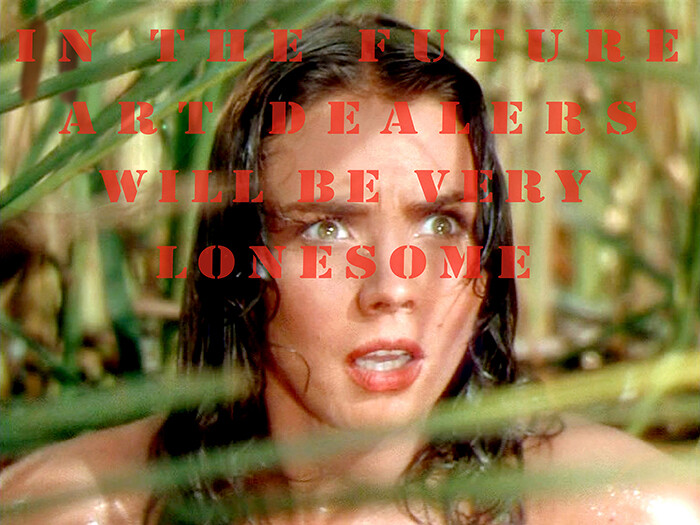
Klaus vom Bruch (b. 1952) is something like this Gallery Weekend’s wicked fairy godmother. Even though he and his gallery SASSA TRÜLZSCH were rightfully invited to participate in the event’s tenth anniversary, vom Bruch’s “In the Future …” series (2008–14) casts some rather sardonic prophesies upon the (art) world. In this utopia/dystopia, prospects are pretty grim for everyone. But after a tour around the galleries, you really hope he’s wrong, especially when he posits: “In the future art dealers will be very lonesome.” As in Berlin, it is still the dealers that dig out the treasures of recent art history and stage positions that you don’t see (enough of) in public institutions.
Just take the wonderful Zofia Kulik (b. 1947). ŻAK | BRANICKA made photographic prints from her 1970/71 diploma work, which were originally 35mm slides. Demonstrating the artist’s early and rigorous turn towards an art that takes the body as its material and starting point, this exhibition titled “Instead of Sculpture – Sequences 1968–71” features work made at a time when her native country of Poland was still under communist rule, and so was the art. Or Geta Brătescu (b. 1926) at Galerie Barbara Weiss who, under the rigid Ceaușescu …
April 29, 2013 – Review
Gallery Weekend Berlin
Kimberly Bradley
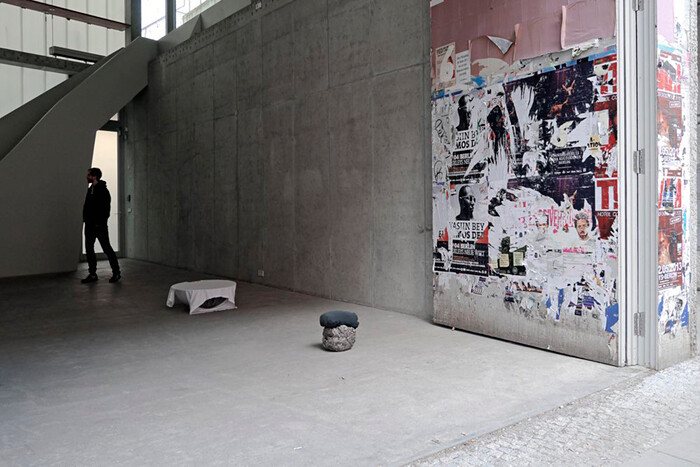
Berlin’s been looking downright spiffy lately. Design hotels (to host the import-export set), shiny office buildings (populated by “for rent” signs), and self-important artisanal coffee shops keep popping up. There’s a new Waldorf-Astoria. People dress better. These days, when you call a restaurant, store, or gallery, someone actually answers.
It wasn’t always this way. Berlin in general is “professionalizing” (though I hate that word) and gentrifying (so what else is new?), and its art world is no exception. For the first time in its nine-year history, Gallery Weekend Berlin—an event founded by a small group of gallerists to lure international collectors to the city for a springtime weekend—has appointed a general manager (the affable Cédric Aurelle). This year, nearly sixty drivers in black BMWs spirited VIPs from gallery to gallery. The fifty-one exhibitors ranged from emerging to established. It’s hard to quantify how many art lovers the event now draws, but “we think there were about 10,000 people here altogether,” Aurelle told me as he emerged on Saturday afternoon from the gallery VeneKlasen Werner, looking as if he’d just come from a calming spa treatment. Professional indeed.
As a local, it was the first time I’d done the whole (okay, almost whole) …
